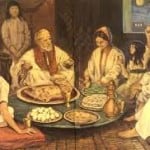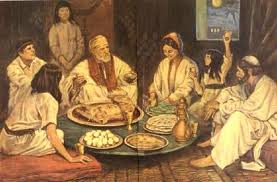Moshe Kempinski
The Torah as a blueprint for life is filled with direction , instructions and tools that enable each individual navigate through the tempestuous waves of life. The transfer of those tools to the people “as a people” began during the Exodus from Egypt.
Our sages remind us regarding Pesach that “In every generation one is required to view oneself as if one personally left Egypt.” (Pesachim 116b),
We are reminded of this because most of us do not realize that in fact we are all still slaves. Every individual continues to be enslaved in their own spiritual and physical Egypt. Each of us are imprisoned in our little boxes of ideology and doctrinaire thinking. Yet if we do not know that we are broken, there is no redemptive yearning to be fixed. If we do not comprehend the shackles that keep us confined there is no passion to be redeemed. Therefore we remain shackled to the whims of our society, its dress codes and moral imperatives. Many of us remain enslaved to old ideations and beliefs without developing the courage to rethink them and break free of them.
Yet as it is true with the illness it is also true of the cure. The tools of redemption that the Israelites were empowered with during the Exodus from Egypt are the same tools that are available to us today in our personal and national exodus from slavery and shackles.
HaShem commands the people regarding three activities and directions.
We read in Shmot ( Exodus) ” And HaShem spoke to Moshe and Aaron in the land of Egypt, saying: ‘This month shall be unto you the beginning of months; it shall be the first month of the year to you.Speak ye unto all the congregation of Israel, saying: In the tenth day of this month they shall take to them every man a lamb, according to their fathers’ houses, a lamb for a household; ( Exodus 12:1-3)
And then further on we read” “And they shall take of the blood, and put it on the two side-posts and on the lintel, upon the houses wherein they shall eat it. And they shall eat the flesh in that night, roast with fire, and unleavened bread; with bitter herbs they shall eat it. ( ibid :7-8)
G-d commands them to do three distinct and important actions. To declare a new month, to gather in the Passover sacrifice and placing part of its blood on the lintel, and the Seder meal. Why those three?
First HaShem commands this seemingly powerless slave people to declare a new month. That is an incredible revelation to a slave people that had no control over their own lives, let alone their time. Yet now HaShem was telling them that based on their sanctification of the new month, He will declare the fifteenth of that month to be a time of holiness and an appointed time of meeting. That is a great lesson for a subjugated people. They have been given a great power and mastery over time They have been given the power to fill time with meaning.
Then HaShem tells them ” they shall take to them every man a lamb, according to their fathers’ houses, a lamb for a household; “ On the 14th day of Nisan, each Israelite family offered the Pesach sacrifice and shared of its meat in a festive meal. The very act of slaughtering an animal that the Egyptians considered one of their gods was itself an act of faith. As Moshe says to Pharoah “:for every shepherd is an abomination unto the Egyptians (Genesis 46: 34.)
In order to be truly free they would need to break away from their fears and slave servitude mentality So G-d declares that not only is every Israelite to take the lamb into the house but in an act of declarative faith they are to take of the blood, and put it on the two side-posts and on the lintel( Exodus12 :7)
And finally HaShem tells them to sit together at a family seder” And on this night, they shall eat the flesh, roasted over the fire, and unleavened cakes; with bitter herbs they shall eat it.”(ibid:8). The Israelites sat down for a thanksgiving feast. This first Passover meal was not only about praise and thanksgiving. It was in fact a deepening declaration of faith. They were celebrating an Exodus that had not yet occurred !
These then are the three tools for spiritual liberation. The first is the eradicating the shackles of fear that limits our growth. The second is to begin to understand that “Time” does not rule over us but rather the opposite is true. It is about learning to gain mastery over one’s own life and about filling the time we keep with meaning. The third is about rejoicing in faith that all that occurs is for the good. As Rabbi Akiva said Kol de-avid Rachmana, le-tov avid – “Everything G-d does is for the best,”( Brachot 60b).
“In every generation one is required to view oneself as if one personally left Egypt.” (Pesachim 116b).
We are living in a world beset by fears and threats. There is much pain in the soul of this people as we have witnessed brutal attacks by our enemies as well as disasters that have decimated families. Yet as we sang during the cursed expulsion from Gush Katif,” an eternal People have no fear of the long voyage”. We declared a new month last Shabbat . We are entering Shabbat HaGadol this week that commemorates the korban Pesach as an act of courage. We will be sitting around the seder table in rejoicing and singing . This will be so, even though the concerns about future threats and the sadness of past tragedies will singe the edges of that rejoicing.
Yet we are emboldened by a powerful verse in the hafatara of this Shabbat hagadol
” For I, HaShem do not change; and you, the sons of Jacob, have not disappeared.” ( Malachi 3:6)
There is much to rejoice and be thankful for .
THE SHORASHIM TORAH STUDY PODCAST
this week we wil be focused on the portion of Tzav Leviticus 6:1–8:36 and its connection to the special haftarah reading from Malachi3:4-24
Acts of faith and courage and G.d’s eternal faithfulness .
To Download
https://shorashimshop.com/audio/haftara_tzav.mp3
